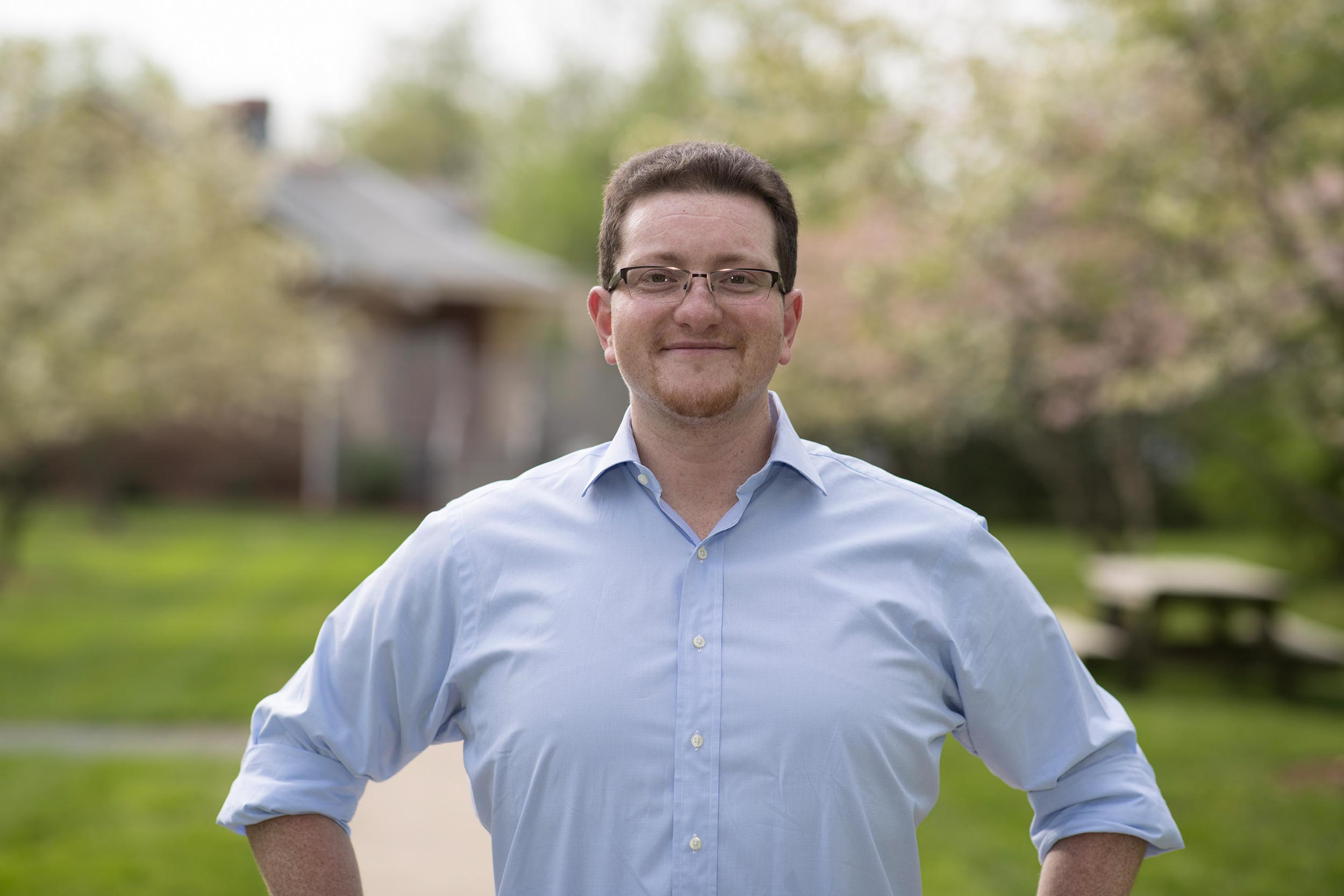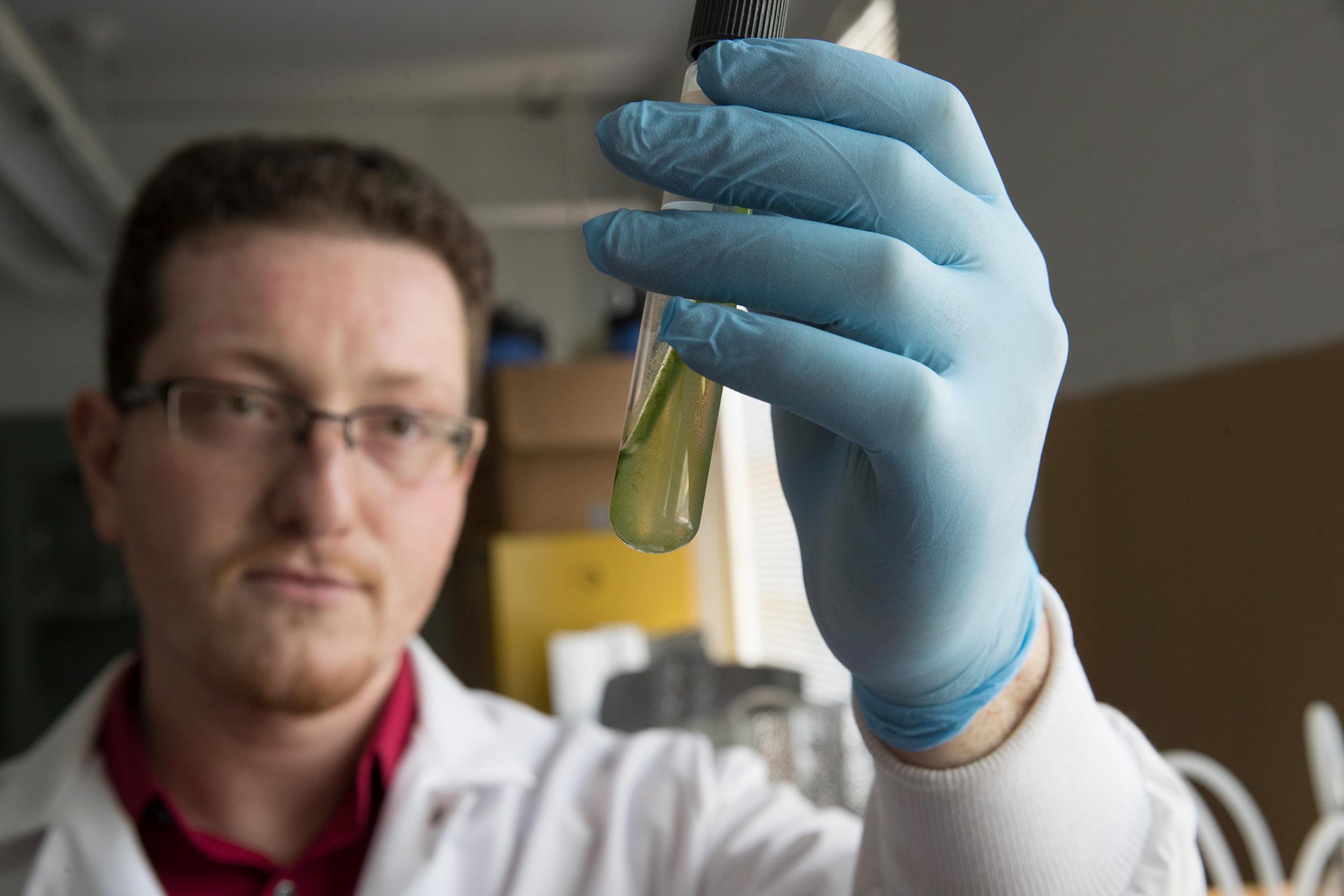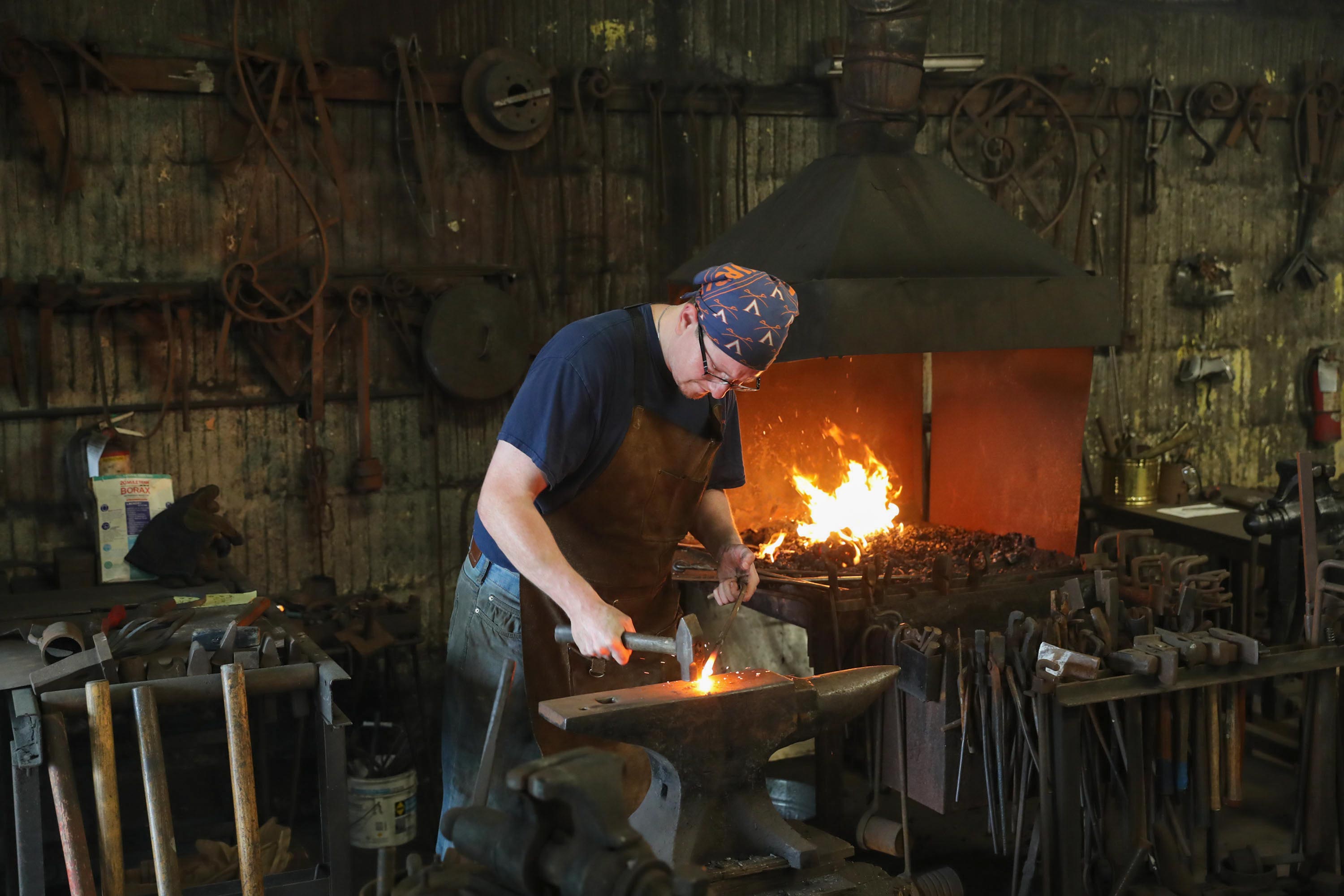Matt Stromberg swung a five-pound hammer in a smooth, steady arc, bringing it down with a sharp clang on a narrow piece of glowing-red steel, showering the immediate area with sparks. He smote the metal five times in even steady strokes, flattening it out on the surface of a 200-year-old anvil. He held up the metal with his left hand, examined what he had done to it, then pushed the steel back into the coke-fired blaze in his forge, unconsciously spinning the hammer around in his large right hand.
Stromberg, wearing a heavy leather apron over his “UVA Engineering” T-shirt and a bandana in University of Virginia blue on his head, is peacefully at home in the forge, surrounded by ancient and utilitarian tools used in the delicate art of shaping iron by hand. He works in Steve Stokes’ forge in Keswick, a 1901 converted railroad warehouse once visited by James Dean, in town for the filming of “Giant.”
“It is my therapy, because I get to turn my brain off and work – and I don’t mean ‘turn my brain off’ as in ‘any idiot can do this,’” he said. “It is hard, difficult work. It is a real master craft.”
Stromberg, who at 34 will graduate from UVA this week with degrees in environmental engineering and environmental science and launch a second career after years of restaurant work, can turn off his brain to theory and mathematics and work with his muscles, feeling by instinct how a piece of metal is responding to fire and hammering and tempering. He takes out the frustrations of the day with the five-pound hammer, while making something practical, such as a knife, or something decorative, such as a metal flower.

“I would say it’s a complete break from my research, but it is not a complete break from engineering,” Stromberg said. “Sometimes that is good. For me, it’s a learning experience, because it is the difference between knowledge and experience.”
Part of becoming an engineer, he said, is learning to analyze problems and solve them.
“You learn all this these incredibly useful things, and you don’t always get to apply them while you are in school,” Stromberg said. “Learning about the structure of the metal I am working with has been super-important, and I have learned as much, if not more, about materials science blacksmithing than I did on my materials science class, though I love professor Marek-Jerzy Pindera, who taught it, and I have nothing but respect for the man.”
Stromberg’s research at UVA deals with using algae to remove antibiotics from wastewater – investigations taking place in the lab of engineering professor Lisa Colosi Peterson. Stromberg is researching the affects the antibiotics have on the algae.
“We can use that particular algae because it is very tolerant of anoxic environments and can be used in wastewater treatment in modern methods of treating things for which we don’t usually treat, such as endocrine disruptors, such as hormones if you are on hormone replacements, or a girl taking birth control, or a guy using a testosterone supplement,” Stromberg said.

Stromberg noted that a wastewater treatment plant is essentially a big bacteria farm, and bacteria break all these other things down.
“The problem is that when [bacteria] are constantly exposed to antibiotics, they become immune, like any other bacteria, and because bacteria can absorb DNA from dead bacteria,” he said. “Effluent water is considered clean water, and it is discharged into the Rivanna River, and those bacteria can become resistant themselves.”
Stromberg is fascinated by the research because it is “the tip of the spear in terms of new and emerging contaminants.”
“Antibiotic resistance as of now kills about 700,000 people worldwide and costs about $2 billion a year,” Stromberg said. “But by the year 2050, if we don’t do anything about it, it will be killing 10 million people a year worldwide, that’s more than the population of Virginia, and it is going to be costing far more.
“Right now it is $2.6 billion a year in the U.S. for extended hospital stays, use of more expensive drugs and things like that, which is more than the cost to develop a new antibiotic over 10 years.”
Stromberg is thankful that UVA give him an opportunity to work on such research as an undergraduate.
“The research I was able to perform is something I would not have had the opportunity to do virtually anywhere else, where you can just get lost in a sea of students,” he said.
It is hard imaging Stromberg getting lost in a sea of anything. He is burly, fast-talking, quick-moving, with the subtle aggressiveness of a New York City native. He started his education at Keene State College in New Hampshire, double-majoring in physics and math, but he had no passion for it. Before he could graduate, his father died and he returned home to Westchester County. From there, he drifted into the restaurant business.
“I ended up staying in the restaurant business far too long,” he said. “I shifted around and worked for some relatively large companies doing restaurant management and helping to rebuild places.
“In the restaurant business, you name it and I have done it, from busboy when I was a kid to manager and regional manager for large companies. And when I was 28, I was in my garden at my apartment and I realized if I was still doing this when I was 30, I was going to be extremely unhappy.”
Living then in Connecticut, he dipped his toe back into the academic waters and took an environmental science course because of his concern about the environment.
“I have always been an avid fisherman, and fishermen are often the staunchest protectors of the environment because they see pollution firsthand,” Stromberg said. “Many of us who go out to the coast, we can see the degradation.”
Stromberg ended up at Norwalk Community College in Norwalk, Connecticut. He applied to several four-year colleges, but came to Charlottesville on a trip to visit his sister and his mother, who had moved there shortly after her husband died.
“I did an impromptu, on-my-own tour of the University with no guide and fell in love,” he said. “It wasn’t just that the Grounds were impressive, it was the fact when I was walking into Thornton Hall, I will never forget this, I asked someone ‘Hey, I’m looking for …’ and I gave them the name of a civil engineering professor and he stopped and said, ‘Yeah, sure, let me show you where he is.’ And that was the general impression I got of everybody here in the South. And when I came down here, I found more of a home than the one I grew up in.”
Stromberg has found the Engineering School to be a good fit.
“I found a real connection to my professors,” he said. “All of my professors have been exceptional, not just in their ability to present the topic, but also in their desire to see me understand it and enjoy it as much as they enjoy teaching it. I feel that the education that I am getting is truly phenomenal.”
Lindsay Ivey-Burden, a senior research associate at the Engineering School and managing director of the Mid-Atlantic Transportation Sustainability Center – University Transportation Center, values Stromberg as a student.
“Because he is older, it is apparent that he appreciates and takes advantage of all the opportunities he’s given,” Ivey-Burden said. “He takes his schoolwork very seriously and has a genuine desire to learn.”

Peterson is also impressed with Stromberg.
“His age and diverse past work experience give him significant focus and sincere appreciation for the opportunity to be at UVA and make the most of his time in college,” she said. “He is uniquely curious and eager to learn. These traits shine through in his research.”
Stromberg has also connected with the students in his classes, who are in most cases more than a decade younger than he is. One thing that is disconcerting to him, however, is that most of his classmates have no real memory of the terror attacks on Sept. 11, 2001.
“I was in high school when that happened and so for me, I remember it as clear as day,” he said. “I remember my father telling me he remembered the Kennedy assassination and that blew my mind. It’s a little weird sometimes to see the difference in perspective.”
While Stromberg is graduating soon, he still has some work to do for the school.
“Last summer I was lucky enough to be part of a class of UVA in the Bahamas, where is it a tropical field ecology and marine biology class,” he said. “You spend most of every day snorkeling on the small island of San Salvador through the coral reefs and learning about everything there and walking through the mangrove forests. It’s beautiful, and this year I get to go back there as a teaching assistant.
“These are opportunities that I would not have had anywhere else. I am extremely grateful for that. I do love not just the people, here but the opportunities that the institution has provided for me. I am very, very happy with them.”
Stromberg, who wants to pursue a Ph.D., has ambitions of helping the world. He is focusing first on aquaculture, because he believes the best way to protect the oceans is not to have to rely on them for fish.
“I hope to do a Ph.D. in aquaculture using polyculture and biomimicry,” he said. “I want to do something that can reduce human impacts on the oceans and all the waterways of the world, and be able to do these things that also help humanity. Imagine building a facility where you can have fresh fish in Colorado and pull a salmon out of a tank that has no PCBs, no mercury, no trichloroethylene in it, because it did not grow up in the ocean. And then there are no transport costs. If I can do that in a system that farms algae [and more] I have a way that produces fresh food for people, no matter where I am in the world.”
As he has matured, Stromberg said he has learned how to guide his own life. He is developing his own plans and pursuing them in his own time, without a concern toward making others happy.
“I am here to make me happy, and I am here to do as much as I can in the time I have,” he said. “I learned to not let anybody else dictate what I want in my own life. I got sick of it.”
He said many of his fellow students are stressed that they are making the right choices in their lives, but he said he said after his experiences in the high-pressure restaurant business, he worries less about the future.
“I know a lot of young people, especially here, worry that they are choosing the right path, in terms of ‘Maybe I should have majored in chemical engineering’ or ‘I should have majored in this, that or the other thing,’” he said. “Well, I can promise you that several jobs out of college, you are going to be in a place you never expected to be. And you can always go back. I am living proof. I think the restaurant business gave me a good sense of how to manage stress.
“The biggest thing I have learned in this entire process is that you don’t judge yourself by where someone else is, and that life is not a race. Life is a series of events, and you get to choose how you are going to interpret them, how you are going to react to them and what you are going to do with all the experience you have gathered, for your own future and the future of everyone you care about.
“For me, I want to enjoy what I do and when I do it.”
Media Contacts
University News Associate Office of University Communications
mkelly@virginia.edu (434) 924-7291










